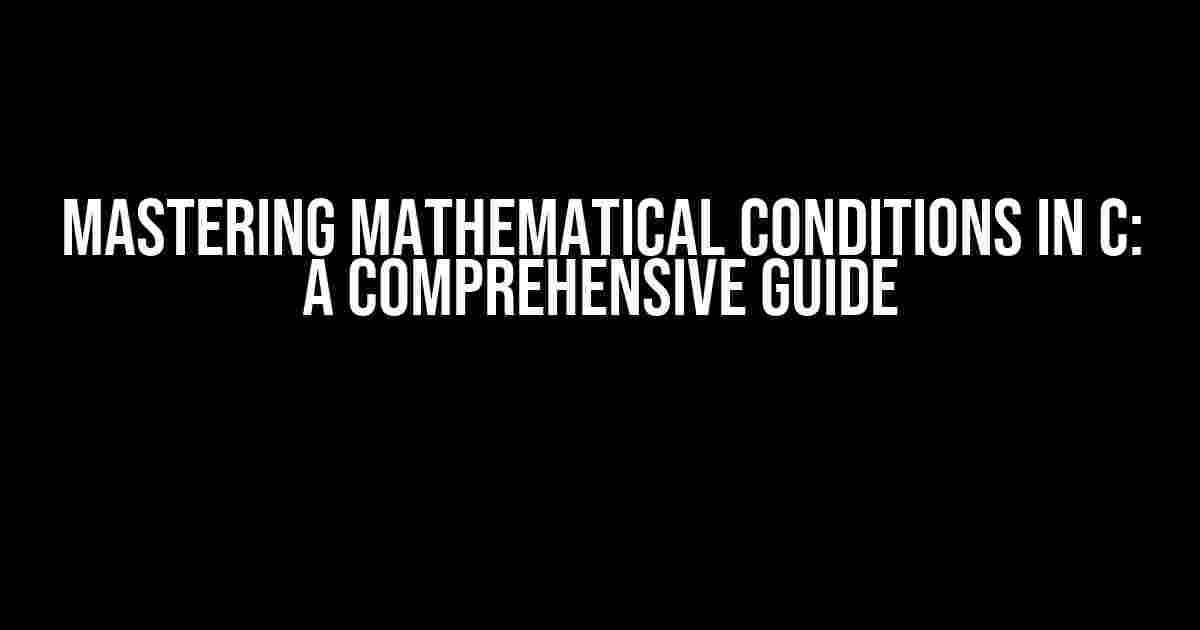Are you tired of seeing your C programs crash due to mathematical conditions gone wrong? Do you want to write robust and efficient code that can handle even the most complex mathematical operations? Look no further! In this article, we’ll dive into the world of mathematical conditions in C, exploring what they are, how they work, and how to use them effectively.
What are Mathematical Conditions in C?
In C, a mathematical condition is a statement that evaluates to either true or false based on a mathematical operation. These conditions are essential in programming, as they allow us to make decisions, loop through data, and control the flow of our programs. Mathematical conditions can be used in various contexts, including if-else statements, while loops, and switch statements.
Types of Mathematical Conditions in C
There are several types of mathematical conditions in C, including:
- Equality Conditions: Evaluate whether two expressions are equal. Example: `a == b`
- Inequality Conditions: Evaluate whether two expressions are not equal. Example: `a != b`
- Relational Conditions: Evaluate whether an expression is greater than, less than, greater than or equal to, or less than or equal to another expression. Examples: `a > b`, `a < b`, `a >= b`, `a <= b`
- Logical Conditions: Evaluate whether a combination of conditions is true. Examples: `a > b && c > d`, `a < b || c < d`
How to Use Mathematical Conditions in C
Now that we’ve covered the basics, let’s dive into some examples to illustrate how to use mathematical conditions in C.
Example 1: Equality Condition
int a = 5;
int b = 5;
if (a == b) {
printf("a is equal to b\n");
} else {
printf("a is not equal to b\n");
}
In this example, we use an equality condition to check whether `a` is equal to `b`. If the condition is true, the program prints “a is equal to b”. Otherwise, it prints “a is not equal to b”.
Example 2: Relational Condition
int a = 5;
int b = 10;
if (a > b) {
printf("a is greater than b\n");
} else {
printf("a is not greater than b\n");
}
In this example, we use a relational condition to check whether `a` is greater than `b`. If the condition is true, the program prints “a is greater than b”. Otherwise, it prints “a is not greater than b”.
Example 3: Logical Condition
int a = 5;
int b = 10;
int c = 15;
if (a > b && c > a) {
printf("a is greater than b and c is greater than a\n");
} else {
printf("The condition is not true\n");
}
In this example, we use a logical condition to check whether `a` is greater than `b` and `c` is greater than `a`. If both conditions are true, the program prints “a is greater than b and c is greater than a”. Otherwise, it prints “The condition is not true”.
Common Errors to Avoid
When working with mathematical conditions in C, it’s easy to make mistakes. Here are some common errors to avoid:
- Assignment instead of comparison: Using a single `=` instead of `==` for comparison. Example: `if (a = b) { … }` instead of `if (a == b) { … }`
- Using the wrong operator: Using the wrong operator for the condition. Example: `if (a > b) { … }` instead of `if (a < b) { ... }`
- Not using parentheses: Not using parentheses to group conditions correctly. Example: `if (a > b && c > d) { … }` instead of `if (a > b && (c > d)) { … }`
Best Practices for Using Mathematical Conditions in C
To write robust and efficient code, follow these best practices:
- Use meaningful variable names: Use descriptive variable names to make your code easy to read and understand.
- Use parentheses to group conditions: Use parentheses to group conditions correctly and avoid ambiguity.
- Test your conditions: Test your conditions thoroughly to ensure they are working as expected.
- Use comments to explain your code: Use comments to explain your code and make it easy for others to understand.
Conclusion
In conclusion, mathematical conditions are a fundamental aspect of programming in C. By mastering these conditions, you can write robust and efficient code that can handle even the most complex mathematical operations. Remember to use meaningful variable names, group conditions correctly, test your conditions thoroughly, and use comments to explain your code.
| Mathematical Condition | Example | Description |
|---|---|---|
| Equality Condition | a == b | Evaluates whether two expressions are equal |
| Inequality Condition | a != b | Evaluates whether two expressions are not equal |
| Relational Condition | a > b | Evaluates whether an expression is greater than, less than, greater than or equal to, or less than or equal to another expression |
| Logical Condition | a > b && c > d | Evaluates whether a combination of conditions is true |
We hope this article has helped you master mathematical conditions in C. Happy coding!
Frequently Asked Question
What is a mathematical condition in C?
A mathematical condition in C is a statement that evaluates to either true or false, used to control the flow of a program. It’s like a yes or no question that determines what the program should do next.
What are the types of mathematical conditions in C?
There are two main types of mathematical conditions in C: relational operators (e.g., ==, !=, >, <, >=, <=) and logical operators (e.g., &&, ||, !). Relational operators compare values, while logical operators combine conditions to create more complex decisions.
How do I use mathematical conditions in if-else statements?
You can use mathematical conditions in if-else statements by placing the condition inside parentheses after the if or else if keyword. For example: if (x > 5) { /* code to execute */ } else { /* alternative code */ }. The condition is evaluated, and if true, the code inside the if block is executed; otherwise, the code inside the else block is executed.
What is the difference between && and || operators?
The && (AND) operator returns true only if both conditions are true, while the || (OR) operator returns true if at least one condition is true. For example: if (x > 5 && y < 10) { /* code to execute */ } means both x > 5 and y < 10 must be true, while if (x > 5 || y < 10) { /* code to execute */ } means either x > 5 or y < 10 (or both) must be true.
Can I use mathematical conditions in loops?
Yes, you can use mathematical conditions in loops, such as while loops and for loops. The condition is evaluated at the beginning of each iteration, and if true, the loop body is executed. For example: while (x < 10) { /* code to execute */ x++; } continues to execute the loop body until x is no longer less than 10.


